
It can be worrying to observe your cat gagging. Some causes of gagging are harmless and others can be quite dangerous. It’s important to know what could be causing gagging so you know how to help your cat.
What Is Gagging?
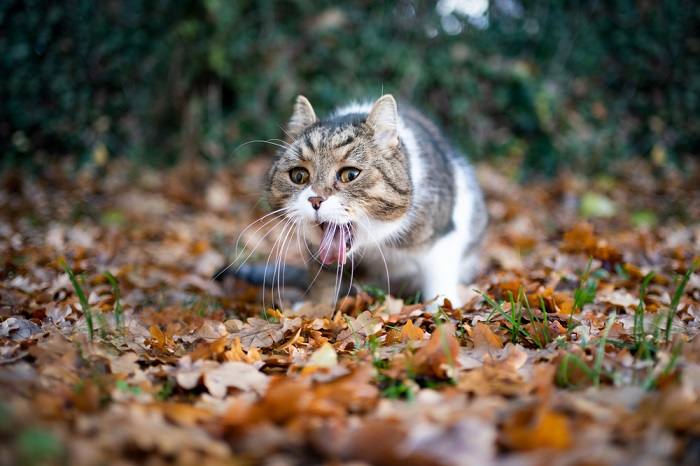
Gagging is a reflex response that protects the body from harmful objects or substances.
Gagging is a normal reaction that can affect a cat’s body (gagging happens in people, too). Sometimes called a “gag reflex” or a “pharyngeal reflex,” gagging occurs when sensory stimulation (such as a foreign object, medicine, etc.) hits the back of the throat and the muscles constrict and try to expel the object from the body. Gagging is a protective mechanism.
Also called “retching” or “dry heaving,” gagging can involve the upper gastrointestinal tract all the way down to the stomach. Gagging is sometimes (but not always) followed by vomiting and may occur with nausea.
Gagging can sometimes be confused with coughing or sneezing so it’s important to watch the symptoms carefully to tell the difference. If you’re not sure, you can take a video to show to your veterinarian.
Also Read: Pica In Cats: Causes, Symptoms, & Treatment
What Causes Gagging In Cats?
As we’ve mentioned, gagging is a reflex that protects the body from harmful substances. Gagging can be caused by a multitude of conditions. The main ones in cats include:
Foreign Bodies

If a cat tries to swallow an object that cannot easily pass, the body might gag in an attempt to push it back out.
Cats, especially young, playful ones, can sometimes ingest harmful objects, such as string, tinsel, plastic, bones, etc. These objects can cause gagging and potentially become stuck in the upper gastrointestinal tract. Objects can also travel to the stomach and intestines where they can cause a blockage, which often causes cause retching and vomiting, along with other symptoms.
Also Read: Why Do Cats Gag At Combs?
Toxins/Harmful Substances
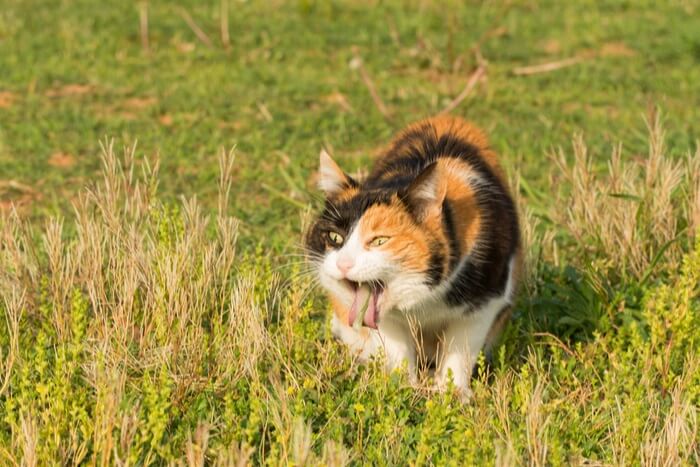
Dangerous substances often cause a cat to gag.
Toxic substances like poisons or household cleaners will likely cause a lot of gagging and vomiting if ingested. This is because they are so irritating to the body and cause multiple clinical signs.
Also Read: Drug Poisoning In Cats: Causes, Symptoms, & Treatment
Eating Habits
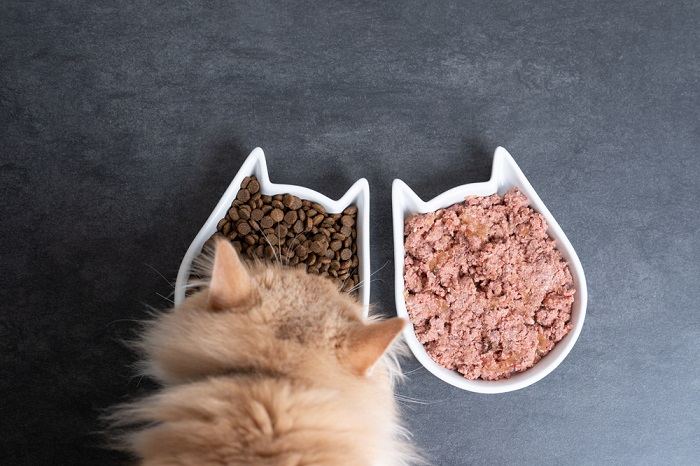
Some cats might “scarf and barf,” which means they eat too quickly, causing them to gag or vomit.
Some cats eat too quickly and this can cause gagging and/or regurgitation of the food. This so-called “scarf and barf” phenomenon is more common with dry kibble food.
Medications
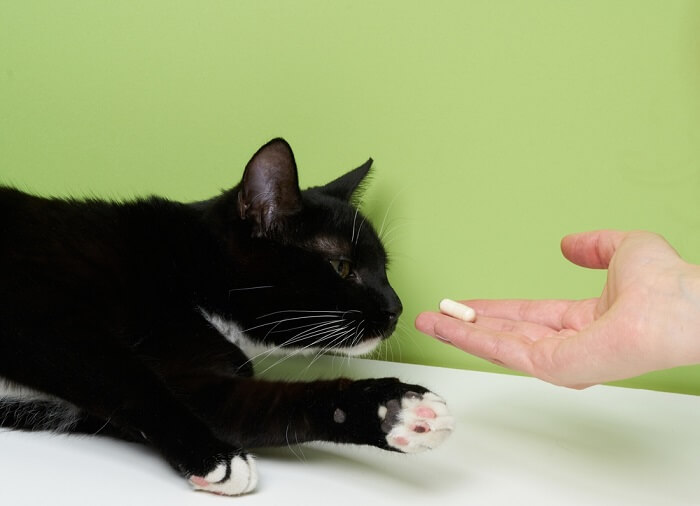
Pills or liquid medications with an unpleasant taste commonly cause gagging in cats.
Giving your cat medication can sometimes cause gagging, especially if the pill or tablet breaks up in their mouth when you’re trying to give them the medication. This is because the medicine doesn’t taste very nice and makes your cat feel sick.
Certain medications can also cause nausea or vomiting as a side effect. If your cat is gagging and they have recently started a new medication, inform your veterinary clinic immediately.
Also Read: How To Give Your Cat A Pill (With 7 Proven Tips!)
Hairballs
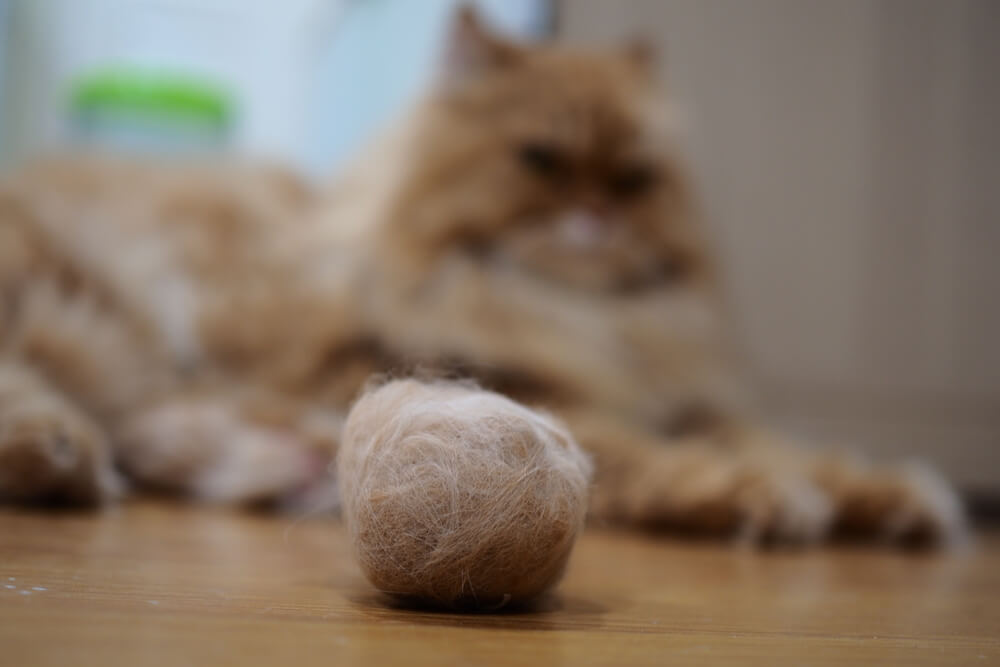
Although cats often vomit up hairballs, sometimes the hairs become stuck in throat, causing repeated gagging.
Hairballs are a very common reason for gagging in cats. As cat owners know, cats spend a huge amount of time grooming. They groom themselves with their tongues, which have tiny spikes on them called papillae, which act like a small comb for your cat’s fur.
During grooming, cats can ingest a lot of the hair and this might form a hairball in your cat’s stomach, which they usually vomit up. You might notice some bile and mucus along with the hair. Some cats struggle to vomit up hairballs, especially long-haired cats. This can cause a lot of gagging and vomiting behavior.
Nausea

Nausea sometimes causes gagging rather than vomiting, especially if the cat ‘s stomach is empty.
When our cats are feeling sick, they can gag or retch. They may or may not bring up stomach contents with the gagging. Nausea can be a symptom of many conditions, from something as simple as tummy upset to more serious illnesses and conditions, like kidney disease or inflammatory bowel disease.
Chronic/Frequent Gagging In Cats
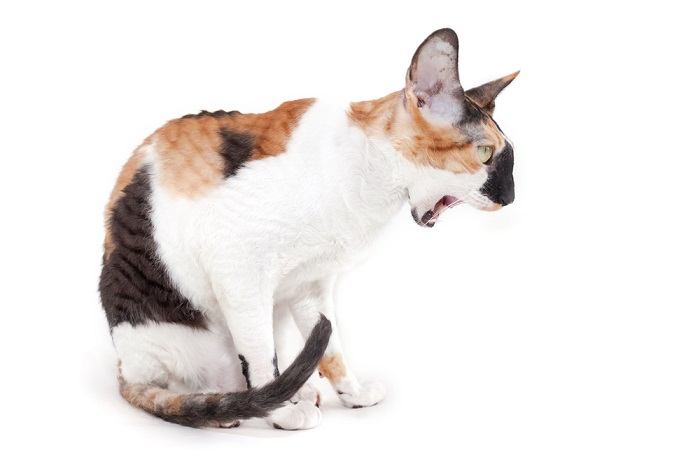
Any cat that is gagging frequently should be examined by a veterinarian.
Chronic or frequent gagging in cats often indicates a chronic condition (one that is ongoing) as opposed to an acute condition (one-off conditions like a foreign body or toxin exposure). Chronic gagging might be caused by hairballs, a food problem (such as eating too fast), or an underlying disease. Diseases that can cause chronic gagging in cats include, but aren’t limited to:
- Inflammatory bowel disease
- Food sensitivities/allergies
- Pancreatitis
- Kidney disease
- Liver disease
- Hyperthyroidism
- Neoplasia (cancer)
What To Do If Your Cat Is Gagging

If you can see an object in your cat’s mouth or throat, contact your vet immediately —don’t try to pull it out or push it down.
Gagging can be quite worrying to witness. Remember to stay calm. If you become panicked, it might make your cat feel the same.
If you can, try to look inside your cat’s mouth. Check for any material like plastic, string, or plant material. It might be useful to have someone else helping you and to use a flashlight. If you see an object, don’t try to pull it out—doing so might cause more damage.
If you see an object, contact your veterinarian right away and arrange an emergency appointment. Don’t offer your cat any food as this might push the object further down and can interfere with veterinary treatment, especially if your vet needs to sedate or anesthetize your cat.
Also Read: Cat Doesn’t Chew Her Food and Throws Up: When To Worry?
How To Help A Gagging Cat

If your cat’s gagging is caused by an eating issue, you can switch your bowls or food to help.
Gagging can be caused by lots of things. There are a few things that you can do to help.
- Slow feeder bowls: If your cat eats very fast and you think this is why they are gagging, invest in a slow feeder bowl. It will make your cat slow down and take their time while eating. You could also look at using interactive feeders, which provide mental stimulation and mimic natural predatory hunting behavior for cats.
- Hairball remedies: If hairballs are the main reason for gagging in your cat, there are lots of things out there that can help. Hairball gels (which act as a lubricant for the hairball), hairball treats, and hairball food are all helpful. Regularly brushing your cat, particularly if they’re long haired, can prevent some hairball issues.
- Toxins/foreign objects: Cat-proof your house as much as possible. Keep cleaning products locked away, avoid leaving string out, dispose of leftover food promptly, and ensure that there’s nothing poisonous or toxic that your cat can access (examples include lily plants, garlic, and onions).
Also Read: The 10 Best Healthy Canned, Soft & Wet Cat Foods For 2023
Treatment Of Gagging In Cats
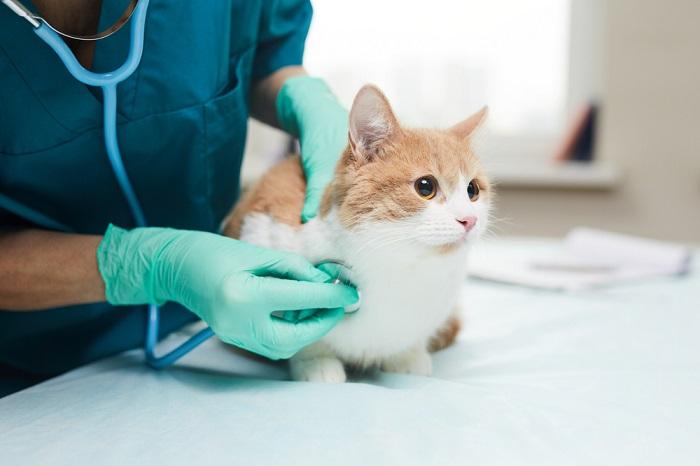
If your cat’s gagging is caused by a medical issue, your veterinarian can diagnosis the cause and prescribe the right treatment.
Some cases of gagging might be resolved by using slow-feeding bowls or addressing hairball issues, but certain cases might be caused by more serious conditions.
If your cat has suddenly started to gag and is clearly distressed, see a veterinarian as soon as possible. Time is of the essence when it comes to poison ingestion or foreign objects that are causing a blockage. Your emergency vet will examine your cat and rule out common causes of sudden gagging/vomiting to reach a diagnosis.
In more chronic cases of gagging, watch your cat for other symptoms, such as lethargy, reduced appetite, weight loss, increased drinking, and urination. These symptoms might indicate an underlying problem. In any case of chronic gagging, schedule an appointment with your veterinarian. The vet will examine your cat and maybe even do some routine blood and urine testing.
Final Thoughts
Most of us have heard a cat gagging at some stage. In a lot of cases, this can be caused by hairballs. However, gagging that is acute and severe can be a sign of a more urgent issue and needs veterinary attention.
Chronic reoccurring gagging might also be a sign of underlying disease and is not something to be ignored or dismissed. If the gagging doesn’t resolve, it’s worth getting your cat checked out by your vet.
Also Read: The 5 Best Hairball Remedies For Cats







